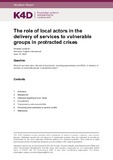The Role of Local Actors in the Delivery of Services to Vulnerable Groups in Protracted Crises
Abstract
As the needs of people affected by conflict, natural disasters and other crises grow year-on-year and become increasingly complex, the need for adapted service delivery has become ever more pressing. There is widespread recognition that top-down, externally driven support to service delivery is ineffective in reaching vulnerable populations in need of humanitarian support. Increasing strategic engagement by and with local actors is now an accepted norm for effective international humanitarian action (Metcalfe-Hough et al., 2021). International commitments have been made to improve the provision of services in protracted crises. A body of literature indicates that engaging local actors in service delivery is one of the main ways to achieve improved service delivery. Despite the general acceptance of this principle, progress in achieving more localised responses to protracted crises has been slow. Evidence on how services can most effectively reach those in need is limited.This report reviews available guidance and evidence on the role of local actors in delivering services to those in need of humanitarian support in protracted crises. The report begins with a brief overview of the evolving discourse on the need for better strategies to incorporate local actors in the delivery of services. The following sections review the available evidence on the different ways local actors have been involved in the delivery of basic services in protracted crises. Section 3 examines local actors’ role in identifying the needs of affected communities. Section 4 examines the role of local actors in the effective coordination of service delivery. Section 5 discusses their role in transparency and accountability, and section 6 considers how local actors’ engagement can contribute to the mitigation of further conflict. Much of the literature in this area takes the form of guidance documents produced by international organisations working in humanitarian action. Some of this guidance refers to case study evidence. Still, most appear to refer to stakeholders’ experiences and conceptual approaches to how service delivery happens in protracted crises. There are a range of instruments that have been deployed to improve service delivery in protracted crises – some of which are referred to in this report – which could be formally evaluated to contribute to the evidence base on how such programmes effectively address the needs of vulnerable groups in need for humanitarian support.
Citation
Lenhardt, A. (2022). The role of local actors in the delivery of services to vulnerable groups in protracted crises. K4D Helpdesk Report 1163. Brighton, UK: Institute of Development Studies. DOI: 10.19088/K4D.2022.127DOI
10.19088/K4D.2022.127Is part of series
K4D Helpdesk;1163Rights holder
© Crown copyright 2022Sponsor
Foreign, Commonwealth and Development Office (FCDO)Collections
- K4D [937]

